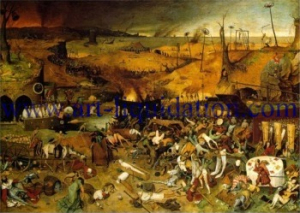
by Murray N. Rothbard
Most people — historians not excepted — are tempted to think of economic and cultural progress as being continuous: in every century people are better off than in the one preceding. This comforting assumption had to be given up quite early when the Dark Ages ensued after the collapse of the Roman Empire. But it was generally held that after the “renaissance” of the 11th century, progress in western Europe was pretty well linear and continuous from that point to the present day.
It took heroic efforts over many decades for economic historians like Professors Armando Sapori and Robert Sabatino Lopez to finally convince the historical profession that there was a grave secular decline in most of western Europe from approximately 1300 to the middle of the 15th century; a period which might be called the Late Middle Ages or the Early Renaissance. This secular decline, mistitled a “depression,” permeated most parts of western Ethe exception of a few Italian city-states.
Continue reading The Great Depression of the 14th Century

